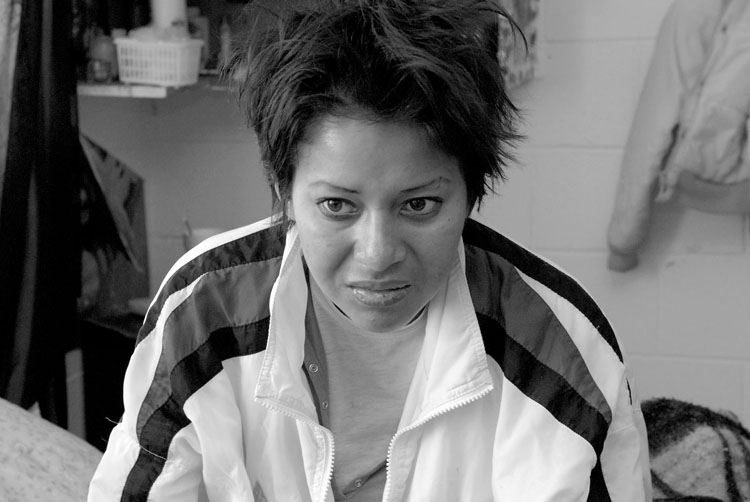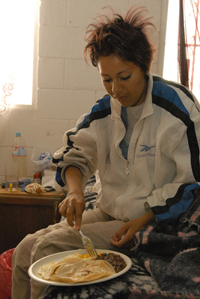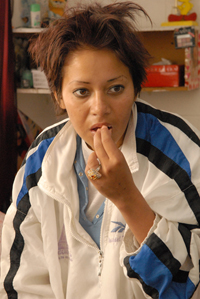 Relato de una segunda generación en Las Memorias
Relato de una segunda generación en Las Memorias
Por Adolfo Flores
El Nuevo Sol, 23 de mayo de 2007
(English Version Included)
Hace veinte años, la madre de Marcela iba a dar a luz. Su tía Margarita, de quince años, acompañaba a la madre mientras las dos iban por los cerros de Guanajuato en busca de un doctor, pero no alcanzaron a llegar. Así que a Margarita le tocó ser la partera de su sobrina, recibiéndola al mundo.
Hoy, Marcela López Bravo vive con VIH, tuberculosis y herpes en el albergue Las Memorias, donde su tía Margarita murió de sida.
López empezó a usar drogas a los trece años y desde ese momento su vida cambió para siempre. La relación con su familia se deterioró, y por ello se fue de su casa. Pasó cuatro años en la calle. Cuatro años que la dejaron gastada y con un espíritu quebrado.
A los 16 años, se internó en el Centro de Integración y Recuperación para Alcohólicos y Drogadictos CIRAD #1, ya que era adicta al cristal. Fue en ese centro de rehabilitación en donde conoció a José Rafael, con quien vivió un año, y quien fue la persona que le contagió el VIH. Tuvieron relaciones sexuales sin condón, y al principio no tenía idea de que era seropositiva. No fue sino hasta que una amiga que trabajaba en el Seguro Social le dijo que José Rafael era seropositivo, cuando lo supo.
Se sintió traicionada y fue a preguntarle a José Rafael. Él no estaba en casa, pero su madre sí. Cuando ella le contó lo que había oído, la madre de José Rafael le dijo que no le dijera nada a su hijo, y le compró una nieve grande para supuestamente consolarla.
"Como no le voy a decir, si es mi vida", le respondió López.
Cuando vio a José Rafael, le dijo que la había traicionado. Él empezó a llorar diciéndole que no le había dicho porque no la quería perder. Ella siguió su relación con él, pero permanecieron enojados por dos meses. Hace tres años, José Rafael murió en sus brazos.
"A veces me acuerdo mucho de él", dijo.
Durante el año que estuvo viviendo con José Rafael, ella conoció a Arturo, un amigo de él que también usaba drogas. A dos meses de que se muriera José Rafael, empezaron una relación. Arturo sabía que López era seropositiva, recordó ella, pero de todos modos tuvieron relaciones sexuales sin protección. Aunque Arturo tomaba drogas, no le gustaba que ella las tomara, y muchas peleas nacieron de ahí. Al séptimo mes, se embarazó, en espera de una niña. Arturo negó que fuera su hija y la dejó.
Ella todavía se siente resentida de lo que le dijo Arturo.
"Me llegó a mirar en la calle con [mi] panza", dijo. "Me dijo que no era de él".
López empezó a vivir en las calles de Rosarito y siguió usando drogas durante el embarazo. Un domingo por la tarde, fue a una cantina, La Escondida, buscando a su amigo Carlos. Pero en su lugar encontró a Jason, un estadounidense de 28 años, con ojos azul grisáceo.
Jason llegó a la vida de López como una luz en un mundo oscuro que poco a poco fue creciendo. La miró sucia, con hambre, y con un mes de embarazo. Le dijo que tenía los ojos más bonitos que había visto en su vida. Le ofreció droga y comida. López, con hambre de las dos, se fue con él. Pero Jason no le dio droga, solamente comida y una casa rodante para que tuviera un techo sobre su cabeza. Le pidió que no usara drogas y que se internara en un centro de rehabilitación.
Jason y López empezaron a tener relaciones sexuales con protección. Jason sabia que ella era seropositiva. Tres semanas después, ella se fue de la casa para seguir su vida en la calle. Sin embargo Jason la encontró y la hizo regresar a casa. Como Jason era de California, él iba cada fin de semana a visitarla. Muchas noches, se la pasaban en un rancho mirando las estrellas. Pero la vida de López no cambió para bien.
Cuando tenía siete meses de embarazo, empezó a tener dolores muy fuertes en el estómago. Fue a la Cruz Roja, donde los doctores le informaron que la niña había llegado muerta. Nunca vio a su hija. Al segundo día, los doctores le dijeron que firmara unos papeles, y después la llevaron a la cárcel por tres días, argumentando que había matado a su hija con las drogas. Ella ya tenía escogido un nombre para su hija, se iba llamar Julie July, pero nunca llegó a bautizarla.
"No es bonito vivir en la calle", dijo, "tienes que soportar muchas cosas".
Durante los años que vivió en la calle, López dormía en un basurero, donde se pasaba los días sentada esperando que alguien pasara para que le diera de comer. Pensaba en irse a casa, pero no podía aguantar la idea de dejar las drogas.
Una noche, una amiga la llevó a prostituirse para juntar dinero para drogarse. Dice que sólo se prostituyo tres veces y usó protección. Le pagaban con droga y dinero.
“No es bonito hacerlo con alguien que no quieres”, dijo mirando hacia el suelo. “Yo lo tuve que hacer por necesidad, por dinero.”
Una de las drogas con que le pagaron la enfermó. No paraba de vomitar y se sentía mareada. Se puso tan grave que su amigo la llevó a la Cruz Roja, donde le inyectaron con penicilina.
Además de pasar hambre, también pasaba peligro. Una noche, un señor que conocía de vista le preguntó si quería cristal. Aceptó la oferta y se drogaron juntos. Cuando ella estaba bajo el efecto de la droga, el señor la violó. Ella luchó contra él, pero sus intentos fueron vanos.
“Todo por andar en la calle”, dijo, “teniendo yo mi casa, mi cuarto y todo”.
Un día lluvioso, Jason le pidió a López que se internara en un centro de rehabilitación. Ese mismo día, la llevó con toda su ropa a internarla al centro. Al llegar, ella se arrepintió y le pidió que se regresaran. Jason se enojo y la llevó a su casa. Fue la única vez que él se enojó con ella, y también la última vez que la vio.
Pasaron sábado y domingo sin que Jason fuera a verla. Ella lloraba porque sentía que había perdido a la persona que le trajo tanta felicidad. Fue cuando tomó una decisión: le pidió a un amigo que la llevara al Centro de Rehabilitación de Enfermos Alcohólicos (CREA) en Rosarito.
Según ella, su lucha para la rehabilitación no sólo incluyó la pelea con las drogas, sino también sobrevivir el maltrato que experimentó en CREA. Cuando llegó una enfermera a la que llamaban La Chamuca (la diabla), le dijo que se quitara un collar que Jason le había regalado para su cumpleaños diecinueve. López no quiso, y fue cuando dice que le dieron el primero de muchos golpes. Luego, fue amarrada y dejada en el suelo frío. Tan frío estaba el piso, que sus manos se durmieron y se pusieron moradas.
Obligaban a las mujeres a cargar baldes de agua arriba y abajo de unas escaleras sin descanso y sin agua. Hasta la directora les pegaba a las mujeres, dijo. López no olvida a una mujer que trató de escaparse del centro de rehabilitación, pero no lo logró, y la directora le dejó su cara morada y sangrante.
A los tres meses, López se enfermo de tuberculosis y fue transferida al centro de salud. No podía caminar y tenía las defensas bajas. Su madre la recogió y la llevó al albergue “Las Memorias”, donde está desde junio de 2006.
Siente una culpabilidad muy grande y se arrepiente de haber lastimado a su familia. Se culpa por la muerte de su abuela, a quien le tocó cuidar a su tía Margarita cuando estaba muriendo de sida. Cuenta que cuando le dijo que era seropositiva, su abuela murió de tristeza muy poco después.
“[Digamos] que yo la maté al saber que algún día me (iba) a morir,” dijo.
Nunca se le olvida el día que su madre se enteró de que era seropositiva. Era el Día de las Madres, y López había ido a casa para darle su regalo. La hermana sabía que ella tenía VIH y le había contado a su madre. Ese día, su mama y su hermana entraron con ella al cuarto y fue cuando su madre le preguntó si era seropositiva.
“Sí”, le dijo López, aclarando que ese fue el momento más difícil de tener el VIH.
Ahora, López está débil con una voz que apenas se escucha. Toma medicinas retrovirales que la ponen muy débil y sueña con regresar a casa con su familia para arreglar su relación con ellos.
"Lo más bonito que pudiera vivir es que mi mamá viniera y se acostara conmigo y me apapachara", dijo.
 ENGLISH VERSION
ENGLISH VERSION
Two Generations in Las Memorias
By Adolfo Flores
El Nuevo Sol, May 23, 2007
Twenty years ago, Marcela’s mother was going to give birth. Her aunt Margarita, of fifteen years, accompanied the mother while the two traveled through the hills of Guanajuato in search of a doctor, but they couldn’t make it. So Margarita had to be the midwife of her niece, bringing her into the world.
Now Marcela López Bravo lives with HIV, tuberculosis and herpes in Casa Hogar Las Memorias, where her aunt Margarita died of AIDS.
López began to use drugs at thirteen and since that moment her life changed forever. The relationship between her family deteriorated and for this reason she left home. She lived for four years on the street. Four years that left her worn out and with a broken spirit.
At 16 she was admitted to the Center for Integration and Recuperation for Alcoholics and Drug Addicts (CIRAD) #1, since she was addicted to crystal. It was in this rehabilitation center that she met José Rafael, with whom she lived with for a year and was the person that gave her HIV. They had sex without a condom and at first had no idea that he was HIV-positive. It wasn’t until a friend that worked in Social Security told Marcela that José Rafael was HIV-positive that she realized it.
She felt betrayed and went to ask José Rafael. He wasn’t home, but his mother was. When she told her what she’d heard, José Rafael’s mother told her not to say anything to her son and bought her a large ice-cream to supposedly comfort her.
“How am I not going to tell him, it is my life,” López responded.
When she saw José Rafael she told him that he had betrayed her. He began to cry telling her that he didn’t say anything because he didn’t want to loose her. She continued her relationship with him, but fought for months to come. Three years ago José Rafael died in her arms.
“Sometimes I think about him a lot,” she said.
During the year in which she lived with José Rafael she met Arturo, a friend of his that also used drugs. Two months after José Rafael died they began a relationship. Arturo knew López was HIV-positive, she remembered, even so they had sex without a condom. Although Arturo used drugs, he didn’t like that she did and many fights were born from this. In the seventh month she became pregnant and was expecting a girl. Arturo denied the unborn child was his and left López.
She is still resentful of what Arturo said.
“He came to see me on the street with my stomach,” López said. “He told me it wasn’t his.”
López began to live on the streets of Rosarito and continued to use drugs during the pregnancy. One Sunday afternoon she went to a bar, La Escondida, looking for her friend Carlos. But in his place she found Jason an American of 28 years with grayish blue eyes.
Jason entered López’s life like a light in a very dark world that little by little continued to grow. He saw her dirty, hungry and one month pregnant. He told her that she had the most beautiful eyes he had ever seen in his life. He offered her drugs and food. López with hunger for both went with him. But Jason didn’t give her drugs, only food and a mobile home so she would have a roof over her head. He asked her not to use drugs and to check into rehab.
Jason and López started having sex with a condom. Jason knew that she was HIV-positive. Three weeks later she ran away to continue her life on the streets. Even so Jason found her and made her return home. Since Jason was from California he would go every weekend to visit her. Many nights they would park in a ranch watch the stars. But López’s life didn’t change for the better.
When she was seventh months pregnant she began to have strong stomach pains. She went to the Red Cross where doctors informed her that the girl had come in dead. She never saw her daughter. The second day the doctors told her to sign some papers and was then taken to jail for three days, arguing that she had killed her daughter with drugs. She already had a name for the daughter, she was to be named Julie July, but never came to baptizing her.
“Living on the streets isn’t nice,” she said, “you have to put up with a lot of things.”
During the years she lived on the streets, López would sleep in a garbage dump, where she would spend days sitting waiting for someone to walk buy and giver her money for food. She thought of going home, but couldn’t stand the thought of leaving drugs.
One night a girlfriend took her to prostitute herself to earn money to drug herself. She said she only prostituted herself three times and that she used protection. Her customers would pay her with drugs and money.
“Doing it with someone you don’t love isn’t nice,” she said looking at the floor. “I did it out of necessity, for money.”
One of the drugs used to pay her made her ill. She wouldn’t stop vomiting and she felt dizzy. She got to the point that her friend took her to the Red Cross, where they injected her with penicillin.
Apart from withstanding hunger, she also withstood danger. One night a man she knew from sight asked her if she wanted crystal. She accepted the offer and they got high on crystal meth together. While she was under the effect of the drugs the man raped her. She fought him but her efforts were in vain.
“All for being on the street,” she said, “having a house, a room and everything.”
One rainy day, Jason asked López to sign herself in at a rehabilitation center. That same day he took her with all of her clothes to admit herself at the center. Upon arriving there she had regrets and asked that they turn back. Jason got angry and took her home. That was the only time he got angry with her and also the last time he saw her.
Saturday and Sunday passed without Jason seeing her. She cried because she felt she had lost the person that had brought her such happiness. It was then that she made a decision: she asked a friend to take her to the Rehabilitation Center for Sick Alcoholics (CREA) in Rosarito.
According to López her battle towards rehabilitation wasn’t only with drugs, but also surviving mistreatment that she experienced in CREA. When a nurse told López to take of a necklace that Jason had given her for her nineteenth birthday. López refused and it was then that the first of many blows. She was then tied up and left on the cold floor. So cold that her hands fell asleep and turned purple.
The women were forced to carry buckets of water up and down a flight of stairs without rest or water. Even the director would hit woman she said. López will never forget a woman who tried to escape from the rehabilitation center, but failed. The director left her face purple and bloody.
Three months later López got sick from tuberculosis and was transferred to a health center. She couldn’t walk and her immunities were low. Her mother picked her up and took her to the hospice “Las Memorias,” where she’s been since June of 2006.
She has a strong guilt and regrets having hurt her family. She blames herself for the death of her grandmother, who cared for her aunt Margarita while she died due to AIDS. She tells that when she told her grandmother she was HIV-positive, her grandmother died of sadness a short time after.
“(Lets say) that I killed her knowing that one day I would die,” López said.
She never forgot the day her mother found out she was HIV-positive. It was Mothers Day and López had gone home to give her a gift. Her sister knew she had HIV and told her mother. That day her mother and sister entered a room with her and it was then that her mother asked her if she was HIV-positive.
“Yes,” López told her, clarifying that it was the most difficult moment of having HIV.
Now, López is weak with a voice that can barely be heard. She takes retroviral medicines that make her weak and dreams of going back home with her family to fix her relationship with her.
“The most beautiful moment that I could live would be that my mother would come and lay down with me and comfort me,” she said.


